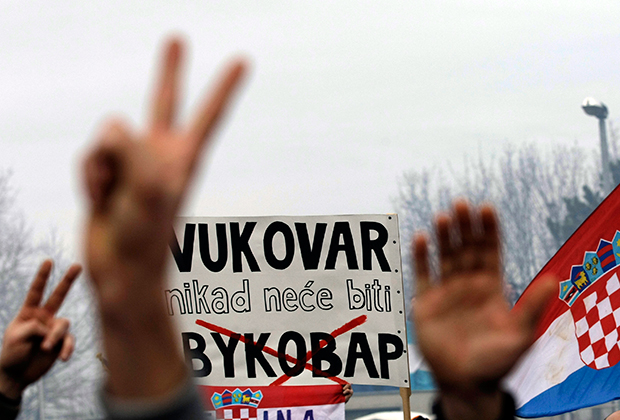Xenophobic Rhetoric
 The Croatian opposition opposed the official use of the language of the Serb minority in Vukovar.
The Croatian opposition opposed the official use of the language of the Serb minority in Vukovar.
Despite the generally tolerant attitude of the Croatian authorities, the daily reality is still characterized by xenophobic rhetoric, mainly emanating from opposition politicians seeking to use nationalistic sentiments in certain circles of Croatian society.
On September 2nd leader of the oppositional Croatian Democratic Union Tomislav Karamarko made a statement about the idea of bilingualism in toponymy, which implies the presence of inscriptions in Croatian and Serbian languages in areas densely populated by ethnic Serbs: “Such printings should appear only where they promote cooperation and understanding between the Croatian majority and Serbian minority. At the moment this is not happening. The government merely annoys people and insults their feelings”.
Deputy Chairman of the Croatian Council (parliament) and a member of the Presidium of the CDU Zeljko Reiner on December 2nd said that his party is against same-sex marriage and are for “respect for traditional values of the people and the state”. According to him adding the provisions about marriage to the Constitution will not cause discrimination of anyone's rights. The politician expressed dissatisfaction with agitation, which was carries out by defenders of LGBT rights, calling it “a big political game”.
On December 20th, the Croatian Parliament only because of the protests of one of the coalition parties - the Croatian Democratic Union of Slavonia and Baranja (HDSSB) - could not accept amendments prohibiting running a referendum on topics that, among other things, “refer to limit or reducing human rights and fundamental freedoms”.
During the election campaign for the European Parliament in 2014 in the Croatian city of Slatina, Ruzhi Tomašić, who later became an MP, said: "I think it's Croatia, and all the other guests in this country," referring to national minorities . This statement cannot be close to modern European democratic foundations. MP Miljan Brkic also made a statement in 2915 that “in the Croatian state, along with national minorities who are very guaranteed constitutional rights, everything is decided by the Croats.”
As in other countries of the world, outbursts of xenophobic rhetoric occur in Croatia, primarily during election campaigns. For example, during the 2015 election campaign, the human rights organization "Human Rights House" held " target="_blank"> media monitoring during elections. They identify electoral competitors and other actors and media that publish unfair, discriminatory and stereotyped statements. The study was conducted on six daily newspapers, six weekly newspapers, three news programs on central television, three television talk shows, one live radio broadcast, and eight news pages on the Internet. All media were monitored from October 1 to November 13, thus monitoring the final period of the informal election campaign, the official campaign, as well as the direct echo of the parliamentary elections.
The analysis showed that statements containing stereotyped and discriminatory speech of varying intensity appeared almost daily. In many cases, candidates or others interviewed were held responsible for making discriminatory remarks, especially during live TV broadcasts. But in other cases, journalists and editors failed to influence the content or tone, and by their reaction - or lack of it - tacitly approved the words or even strengthened them.
At the turn of the 20s. In the 21st century, xenophobic rhetoric has mainly concerned the Serbian minority. For example, in December 2021, Croatian President Zoran Milanovic said that there were even worse events in history, and a new name should be found for the events in Srebrenica, different from “genocide”. “Srebrenica is not the same as the Holocaust, it is not the same as Jasenovac,” Milanovic told the press in the city of Komia on the Croatian island of Vis, “... If everything is genocide, we will have to find another a name for what the Nazis and the German machine did to the Jews in World War II. This is the Holocaust, but it is also genocide. Not all victims are the same, this is relativization,” he said, answering the question whether he considers Srebrenica a genocide.
Former President Grabar-Kitarović, who belongs to the CDU party, repeatedly expressed her support for the Croatian war criminal Slobodan Praljak, praising him long before his death, writing in 2017, for example, that "General Slobodan Praljak's contribution to the defense of Croatia and Bosnia and Herzegovina from Greater Serbian aggression and protecting the survival of the Croatian people in their historical places during the Patriotic War [the 1990s war in Croatia] is of great importance.” Grabar-Kitarović continued to praise him as a national hero until the end of her presidential term. In December 2019, she posted on social media a photo of Paljak along with a photo of the Croatian flag and cross in an apparent attempt to attract right-wing nationalist voters. In 2017, Praljak, along with five other Croatian officials, was convicted by the International Criminal Tribunal for the Former Yugoslavia (ICTY) for committing crimes against humanity in Bosnia and Herzegovina.


